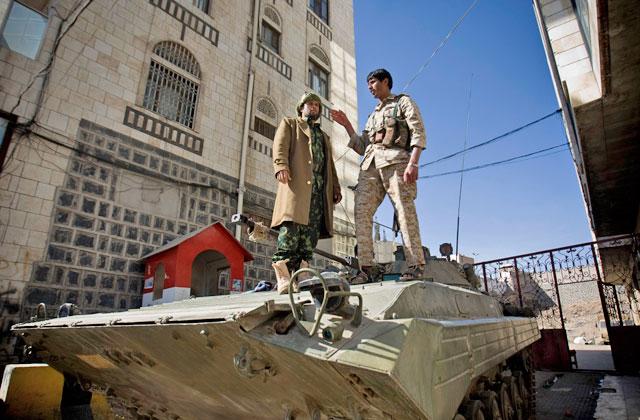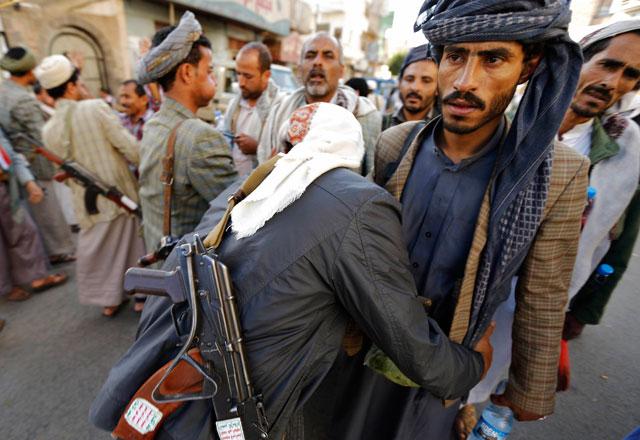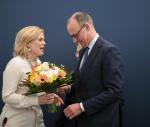You are here
Rival Yemeni protests as talks with Shiite rebels fail
By AFP - Aug 24,2014 - Last updated at Aug 24,2014
SANAA — Rival protests stoked up tension in Yemeni capital Sanaa on Sunday as a presidential negotiating team abandoned talks with Shiite rebels, accusing them of seeking to ignite a war.
President Abed Rabbo Mansour Hadi urged "vigilance and increased preparation to face any options that could be imposed" on Yemen, at a meeting with the supreme security and military committee, state news agency Saba reported.
Pro and anti-government protest leaders used loud hailers to stir up their followers at rallies in different parts of Sanaa, although there were no clashes between the groups, as had been feared.
Thousands joined the rebel demonstration in the north of the city, near the interior ministry and other government offices, but tens of thousands gathered in central Sanaa to support Hadi's government, an AFP correspondent reported.
Hadi's envoys had held talks with rebel commander Abdulmalik Al Houthi since Thursday in a bid to persuade him to abandon protests organised by his supporters to demand the resignation of the government and reversal of fuel price increases.
But the presidential team's spokesman, Abdulmalek Al Mikhlafi, said the negotiations in Saada, the rebels' stronghold in the mountains of the far north, had failed.
The rebels "rejected all the proposals presented to them", said Mikhlafi.
"It seems like the Houthis want a war," he added, referring to the Shiite rebels, also known as Ansarullah or Zaidi, who have been fighting government troops in the northern mountains on and off since 2004.
At Sunday's rallies in Sanaa, rebels followers chanted: "The people want the government out" while five kilometres away the slogans from Hadi's supporters predicted the failure of the rebellion.
"Oh, Houthi, Sanaa will be your tomb" and "Houthi is God's enemy" the crowds jeered.
Tens of thousands of armed rebels have set up fortified protest camps around the capital over the past week to press their demands.
One encampment is located in Sanaa's northern district on a road leading to the airport.
Mikhlafi told reporters on Saturday that his team had handed Houthi a draft proposal to form a technocrat government within a one-month period from the date of signing the accord.
Houthi spokesman Mohammed Abdulsalam, however, pinned the blame on authorities, saying the presidential team "had no powers" to guarantee his group's demands.
Apart from revoking the fuel price hikes and the government's resignation, the demands include "a partnership in all the state structures", he said.
Authorities in Sanaa had already stepped-up security around vital installations and government buildings including the airport and the interior ministry.
"We are living in constant fear of the situation deteriorating and of a scenario similar to what happened in Amran," activist Amal Al Yafie told AFP.
She was referring to the northern city which the Shiite rebels seized after deadly battles in July, before they later agreed to withdraw.
Analysts said the rebels are seeking to establish themselves as the dominant force in Yemen's northern highlands and to secure a larger share of power in a future federal government.
The Zaidi Shiites, a minority in mainly Sunni Yemen, form the majority in the northern highlands, including the Saada region.
Their protest action has raised fears of new violence in Yemen, which already faces an Al Qaeda insurgency and a campaign for renewed independence for the south.
Related Articles
Yemeni President Abed-Rabbo Mansour Hadi resigned on Thursday, a government spokesman said, throwing the country deeper into chaos days after Houthi rebels battled their way into his presidential palace.
At least 21 people were killed in weekend clashes between Shiite rebels and pro-government tribesmen in the north of Yemen, tribal sources said Sunday.
President Abed Rabbo Mansour Hadi warned Tuesday of "civil war" in Sunni-majority Yemen and vowed to restore state authority as Shiite rebels appeared to be in near-total control of the capital.


















